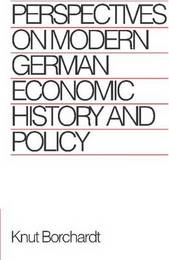
|
Perspectives on Modern German Economic History and Policy
Paperback / softback
Main Details
| Title |
Perspectives on Modern German Economic History and Policy
|
| Authors and Contributors |
By (author) Knut Borchardt
|
|
Translated by Peter Lambert
|
| Physical Properties |
| Format:Paperback / softback | | Pages:296 | | Dimensions(mm): Height 230,Width 153 |
|
| Category/Genre | World history - from c 1900 to now |
|---|
| ISBN/Barcode |
9780521368582
|
| Classifications | Dewey:338.943 |
|---|
| Audience | | Professional & Vocational | |
|---|
| Illustrations |
Worked examples or Exercises
|
|
Publishing Details |
| Publisher |
Cambridge University Press
|
| Imprint |
Cambridge University Press
|
| Publication Date |
30 May 1991 |
| Publication Country |
United Kingdom
|
Description
This is the long-awaited English-language edition of Professor Borchardt's brilliant and controversial essays on German economic history in the nineteenth and twentieth centuries. The essays are nontechnical in character, and thus should be accessible to a wide range of historians. In particular they reinforce and illustrate the sheer usefulness of economic history for political historians and indeed for anyone interested in how detailed historical evidence can be brought to bear on apparently intractable problems. The essays deal in the main with three topics: the determinants of economic growth in nineteenth-century Germany; the major patterns of Germany's economic growth in the longer term up to the present day; and the structural crisis of the Weimar Republic before the slump of the 1930s, and the total absence of any economic "miracle weapon" against Hitler's seizure of power. In particular, Professor Borchardt's controversial interpretations of the economic history of the interwar period have already triggered a lively debate which will be enhanced by the appearance of an English edition.
Reviews' ... a collection of illuminating, crisply written and pugnacious essays on the economic history of nineteenth- and twentieth-century Germany, thematically united in that they rest on the application to specific situations of long-run perspectives. They have become 'classic' articles in that they have opened up major new areas of investigation.' Harold James, Princeton University
|